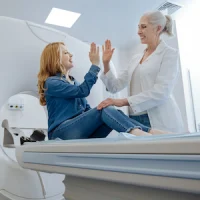Radiologists are increasing reporting they are burning out. In a report published in Academic Radiology, professionals say "we need a new way of approaching burnout." A recent survey presented in the report shows radiology has climbed to no. 7 among all medical specialities (up from 20th place) with more than 45% of radiologists reporting they have burned out.
Radiologists are suffering from increasing emotional exhaustion, depersonalisation, and inefficiency. Burnout in radiology is fast deteriorating and researchers are looking for new ways to address finding solutions to this growing epidemic.
You may also like: Rads burnout: be resilient, bend don't break
Dealing with burnout is an extremely important mission for those educating and training the next generation of radiologists. Medical students, residents, fellows, and newly qualified radiologists must master core knowledge and skills, but they also need to develop habits that help them find fulfilment in their careers, build and expand the kinds of organisations that promote it. By teaching more effective approaches to burnout, we can place the profession's future on a firmer foundation.
Appreciative Inquiry
One such approach presented in the report is referred to as "appreciative inquiry," a model of organisational development introduced in the late 1980s. Contrary to the more commonly applied problem-based models, that often exacerbate the exact problems they seek to address, appreciative inquiry is a way to shift the conversation to the best in what is happening, with the aim of accentuating and building on it. If the proponents of appreciative inquiry are correct, radiologists need to stop focusing exclusively on “What is broken?” and “What needs to be fixed?” and instead ask, “What brings us pride and a sense of fulfilment?”
According to the report, appreciative inquiry assumes that what we do is founded on what we believe to be true, both individually and together. If radiologists can enhance their daily conversations – both intrapersonal and interpersonal – they can improve on their work. Radiologists are constantly reshaping their work and organisations by asking questions about them, and asking better ones can take radiology in better directions. In a sense, every job and every organisation has a story, and by changing these stories, radiologists can both do better work and derive more fulfilment from it.
The report explains that if we talk mainly about the bleak future that awaits radiologists, over time we will become increasingly consigned to it, dulling our imaginations, draining our enthusiasm, and depriving ourselves of hope. On the other hand, if radiologists can focus on the causes for hope and their enhancement, the outlook will brighten. By focusing on what radiologists do or could do best, they can augment openness to change, energy levels, and creativity. They can turn a dark and depressing narrative into one that offers real hope, revitalising both their daily work and the organisations in which they practice.
The Discourse of Deficit
Before adopting to appreciative inquiry's solution, the study states it is important to understand in more depth how focusing on burnout often merely exacerbates the problem. Unsurprisingly, most discussions of burnout tend to be focused on deficits and problems. They are dominated by sentiments such as “We are not measuring up,” “We are performing poorly,” and “Things around here are getting more and more discouraging.” Radiologists begin to think of themselves as suffering from something approaching a mental illness, which undermines our sense of fulfilment.
A substantial difficulty with much discourse around burnout is the supposition that radiologists lack the resources necessary to solve the problem. Too often, it is supposed that radiologists and radiology organisations need help from outside experts. The implicit assumption is this: so long as radiologists and radiology organisations have only themselves to rely on, we are doomed. Unfortunately, this only exacerbates the sense of inefficacy that lies at the core of burnout.
This is one example of how challenges can be elevated to the level of evidence of a deep and pervasive pathology. The fact that work is sometimes frustrating confirms emotional exhaustion. The fact that radiologists sometimes feel isolated is taken as evidence that their work is depersonalised. In addition, the fact that radiologists cannot instantly remove such obstacles is taken as proof that they are powerless. In other words, a relentlessly deficit-focused discourse tends to deepen the very deficits it describes.
As such findings get disseminated both within and outside the organisation, a profession-wide narrative of crisis begins to develop. More and more presentations, articles, and casual conversations focus on how desperate things are, functioning as self-fulfilling prophecies and accelerating the pace of descent.
Over time, the focus on burnout exerts a greater and greater training effect. Radiologists learn how to talk about burnout, becoming increasingly familiar with its symptoms and signs, its adverse effects, and the difficulties associated with remedying it. In learning more and more about burnout, the report states, "we get better and better at burning out." In some cases, cultures can become infected with the cynical notion that it is socially unacceptable or simply “uncool” to be caught taking pride or finding joy in work.
None of this is to say that burnout is nonexistent, a mere figment of our imaginations. Many radiologists have legitimate reasons to be discouraged. The point is not that radiologists problems exist only in their minds, but rather that an exclusively problem-focused approach often exacerbates them. The point is not that they should ignore what is not working and pretend “All is for the best in the best of all possible worlds,” but that we need to give more attention to what is good in our work.
An Appreciative Response
Appreciative inquiry urges radiologists to stop seeing burnout as a kind of mental illness begging for a cure, and instead to focus on the sources of joy and fulfilment in work. By shifting the conversations to what works well, radiologists can find new opportunities to improve. What we know and believe are not merely the products of empirical data, but rather created through conversation. What we think we know is often as important as anything we can justify in evidence-based terms. By shifting to strengths, we can build hope.
Burnout tends to be a narrative of isolation,but when radiologists come together to talk about what makes work and life meaningful, they promote community. Appreciative inquiry is inherently collaborative – its methodology rests on having some members of an organisation talk with other members about the things that make them proud, fill them with joy, and give them a sense that they are really coming to life. The simple act of discussing such experiences builds a shared sense of what is best about work and what we can accentuate going forward.
The fact that appreciative inquiry focuses on what is working well might suggest that it is inherently conservative, tending to promote and preserve the status quo. This is not necessarily so. In fact, by helping us to see what matters most to us about work, it helps to illuminate a path of change toward more meaning and fulfilment. For example, radiologists who discover that face-to-face consultation provides the most fulfilment might try to reorganise work to promote more such interactions.
The point is this: radiologists can best address the conditions that underlie burnout – and thereby avoid burning themselves up – not primarily by delving deeper and deeper into problems, but by treating their work and the organisations in which they practice it in as sources of learning and inspiration. Radiologists, concludes the report, often have everything they need to do better; they just need to get started on the kinds of conversations that will help us recognise and draw fully on it.
Source: Academic Radiology
Image credit: iStock
References:
Latest Articles
Radiology, burnout, Radiologists , radiologists burnout
Radiologists are increasing reporting they are burning out. In a report published in Academic Radiology, professionals say "we need a new way of approaching burnout."










